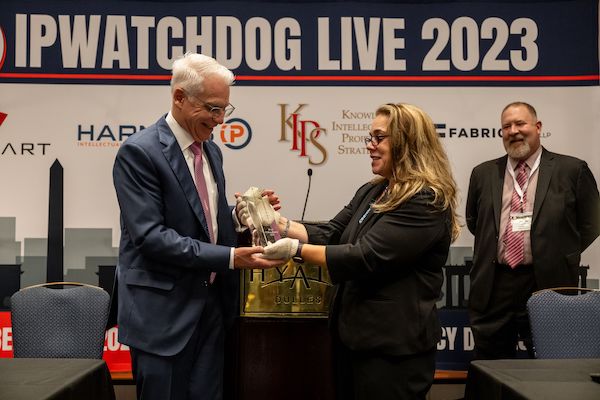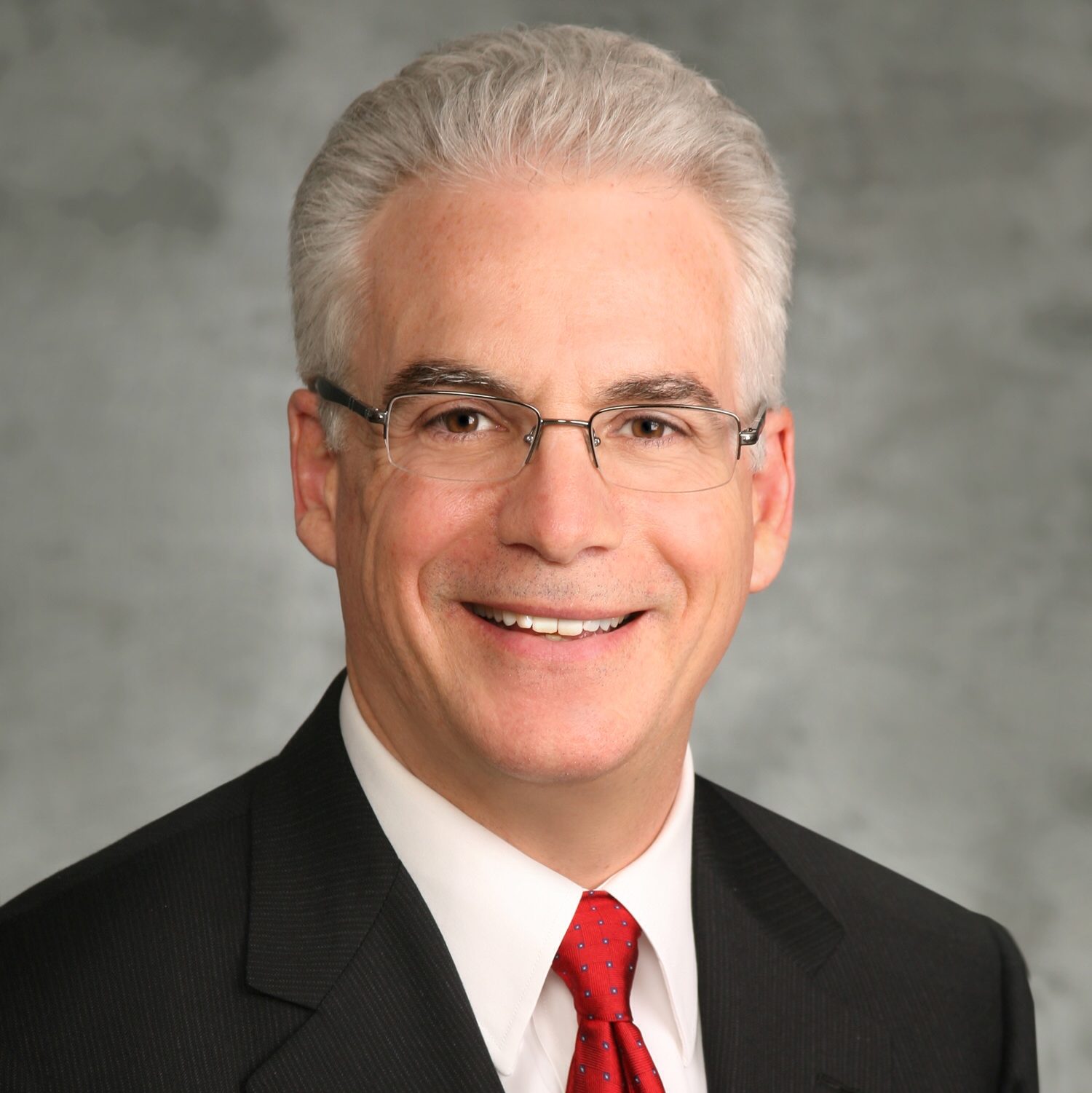“When other nations are using their patent systems to tactical, commercial, and ultimately political advantage, we cannot afford to retreat from fundamental principles that have made ours the most innovative nation on earth. And, in particular, we cannot cede our technological leadership to those who do not share a commitment to democratic principles, free and fair markets, and fundamental human rights.”
The following is a transcript of the speech delivered by Brian O’Shaughnessy, Partner, and Chair of IP Transactions & Licensing Group at Dinsmore & Shohl LLP, who is the 2023 recipient of The Paul Michel Award. He was presented with the award on Sunday, September 17, 2023, during IPWatchdog LIVE 2023.
 Thank you, Gene and Renee. And thank you Chief Judge Michel for this great honor.
Thank you, Gene and Renee. And thank you Chief Judge Michel for this great honor.
As we all know, the real heroes here are those three. Gene and Renee, and their team at IPWatchdog, and Chief Judge Michel, are all remarkable advocates for our IP system.
Our patent system has come under attack in recent years, by a variety of actors, public and private, and for various reasons – some noble but ill-informed, and some not so noble. And, regrettably, to some extent they’ve been successful, largely due to public misunderstanding.
I’m honored to head the public policy function of the Licensing Executives Society USA & Canada (LES). Judge Michel routinely joins our monthly calls, sharing insights from his time on the Hill, and on the Federal Circuit, keeping us up to date on what’s really going on, and how we might counter those attacks. When Judge Michel speaks, people listen.
Early in my tenure as an LES board member, I saw that our educational function could serve a broader purpose, going beyond our members to legislators and policymakers, giving insight on the promise of our IP system. Judge Michel encouraged us to speak out for IP rights, noting that LES has a unique voice, speaking for a broad range of industries from high technology to pharma, for both licensors and licensees, and for global executives and fledgling entrepreneurs. And we’ve tried to heed his advice.
In taking up that charge, I generally focus on first principles and the evolution of IP as a property right.
A few years ago at an LES Annual Meeting, I took a step back from the usual tack of reviewing case law, and organized “Literary Licensing,” a workshop focused on a contract from great literature. See what we might learn from the classics. We took up The Merchant of Venice, and the infamous loan secured by the pound of flesh.
I was fortunate in finding a panelist in Professor Nate Oman, the Rollins Professor of Law at William & Mary Law School. He’s devoted a lot of attention to MOV and its coincidence with Slade’s Case, a contemporaneous English contracts case. Prior to Slade’s Case, contracts were seen as moral obligations, more the realm of the church than courts. The violation of a contract had principally moral and reputational consequences rather than legal.
That was fine in a small, regional medieval economy, but Slade’s Case became consequential because it recognized that an enforcement regime that relied only on a reputational threat would not work in a larger, market-based economy. Shakespeare was known to take inspiration from the legal developments of the day, and he chose Venice perhaps because it was the busiest mercantile economy. Markets were everything in Venice. Legal regimes that fostered commerce, and facilitated widespread international trade, were enthusiastically embraced.
Emblematic of the Venetian mindset is that Venice gave birth to the very first statutory patent system. That system came from a recognition that market-based incentives could undo the secrecy of the Guild system, thereby exposing useful tools and techniques to all.
Throughout history, economies that are supported by robust principles of contract law tend to be strong, diversified, and resilient; whereas those that are not, tend to be small, regional, and fragile.
Now, this is significant for those of us in the IP world. Accepting an intangible – a promise – as a form of property was new, but it aligns nicely with IP, and its inherently intangible nature.
Our Constitution, of course, goes beyond what was contemplated in earlier patent systems, and set the stage for all modern patent systems. Congress is to promote the progress of the useful arts by granting to inventors exclusive rights in their discoveries, conceiving a system deliberately egalitarian – focused on the inventor and meritorious discovery. As we know, the Framers were influenced by John Locke, natural rights, and the just rewards of individuals who devote labor and personal industry to improvements of the commons.
When the delegates were debating the Constitutional provision that would create our patent system, they took a break from their deliberations to witness an exhibition of John Fitch’s steamboat. In that, they saw the harbinger of a new era, and saw that if the United States was to compete with established economies, it would need to transition from an agrarian, regional economy to an industrial, global economy that would inevitably rely on the tools of modern manufacture and transport.
And they were spot on. Modern innovations and discoveries have improved our lives immensely. Last year, I flew to Venice for the LES International Conference in in a fraction of the time it would have taken aboard one of Antonio’s ships. Other remarkable innovations of just the past half-century include the birth of biotechnology and nanotechnology. Our newsfeeds are filled with the promise – and the threats – of AI; and how it promises to revolutionize industries, economies, and society in general. Next month, at the LES Annual meeting in Chicago I will be conducting a fireside chat with Director Vidal and Canadian IP Office CEO Georgaras on IP in space, discussing how the increasingly private, commercial development of space will affect IP invented and used beyond conventional terrestrial borders.
These and so many other innovations are having profound effects on commerce, and our every-day lives. And, of course, we want them to keep coming, for the good of us all.
So, we can’t afford to turn our back on the principles the Framers embraced. The importance of innovation in today’s knowledge economy is greater than in those early days. We need to keep that sense of excitement and enthusiasm for the future. We’ve got to recognize that the spirit of innovation does not come naturally, it needs a legal system that adds the fuel of interest to the fire of genius. We need to promote the progress of useful arts by recognizing patent eligibility for a broad range of discoveries. In doing so, we will preserve our national heritage of innovation, and ensure our continued economic vitality and national security. When other nations are using their patent systems to tactical, commercial, and ultimately political advantage, we cannot afford to retreat from fundamental principles that have made ours the most innovative nation on earth. And, in particular, we cannot cede our technological leadership to those who do not share a commitment to democratic principles, free and fair markets, and fundamental human rights. Let’s all work together to keep our IP system alive and well, and protected from those who would distort it for short-term benefit or unfair advantage.
In other words, let’s join in common cause with Chief Judge Michel , and with Gene and Renee, in supporting the future of our IP system.
Thank you.

![[IPWatchdog Logo]](https://ipwatchdog.com/wp-content/themes/IPWatchdog%20-%202023/assets/images/temp/logo-small@2x.png)

![[Advertisement]](https://ipwatchdog.com/wp-content/uploads/2024/04/UnitedLex-May-2-2024-sidebar-700x500-1.jpg)
![[Advertisement]](https://ipwatchdog.com/wp-content/uploads/2024/04/Patent-Litigation-Masters-2024-sidebar-700x500-1.jpg)

![[Advertisement]](https://ipwatchdog.com/wp-content/uploads/2021/12/WEBINAR-336-x-280-px.png)
![[Advertisement]](https://ipwatchdog.com/wp-content/uploads/2021/12/2021-Patent-Practice-on-Demand-recorded-Feb-2021-336-x-280.jpg)
![[Advertisement]](https://ipwatchdog.com/wp-content/uploads/2021/12/Ad-4-The-Invent-Patent-System™.png)






Join the Discussion
No comments yet.